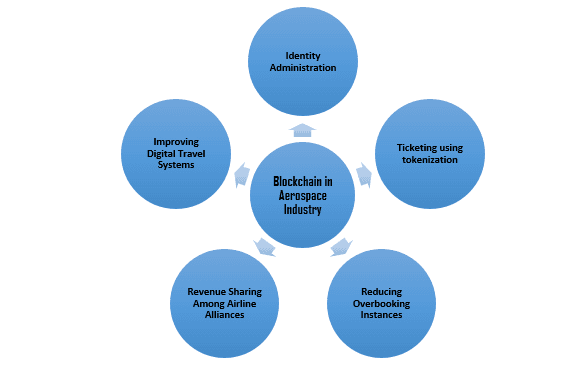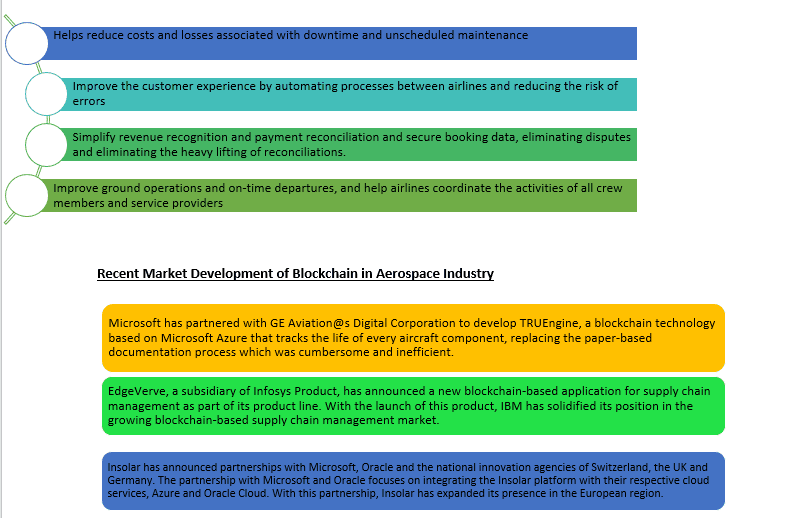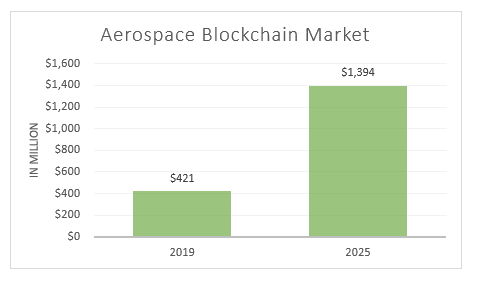Blockchain dans l'aérospatiale
Aperçu
L'industrie aérospatiale est en constante évolution et s'adapte aux nouvelles technologies. Au cours des dernières décennies, des progrès considérables ont été réalisés en matière d'innovation technologique. Mais la cybersécurité et l'expérience client restent les deux problèmes les plus urgents dans l'industrie aérospatiale.
La technologie Blockchain dans l'aérospatiale peut aider à protéger et à améliorer les opérations. Elle offre de nouvelles façons de collecter et de crypter les informations, ce qui rend le piratage extrêmement difficile. Cependant, la gestion des services de vol en ligne crée un risque de sécurité supplémentaire.
Le niveau supplémentaire de cryptage et de sécurité fourni par les implémentations de la blockchain est extrêmement bénéfique pour la protection des informations sensibles. Il résout la plupart, voire la totalité, des problèmes de sécurité dans le cyberespace.
Fonctions de l'utilisation de la blockchain dans l'aérospatiale

- Gestion des identités
La gestion des identités pose de sérieux risques dans l'industrie aérospatiale, y compris le potentiel d'activité terroriste dans les aéroports ou sur les vols. La biométrie peut être utilisée pour authentifier les identités sur la blockchain. En plus de réduire les erreurs humaines lors de la vérification des documents d'identité, la blockchain pourrait éventuellement conduire à l'identification biométrique remplaçant les passeports papier.
- Billetterie utilisant la tokenisation
Les systèmes de billetterie traditionnels sont sujets aux erreurs d'émission de billets ainsi qu'aux défaillances du système. Les smart notes basées sur la blockchain sont encore un concept spéculatif. De plus, elle peut intégrer l'identification biométrique pour éliminer la nécessité pour les clients de transporter des billets et des pièces d'identité numériques ou physiques.
- Sécurité des systèmes d'enregistrement de vols
La blockchain peut aider à collecter et à stocker toutes les données relatives à un aéronef, telles que le manifeste, la trajectoire de vol, l'embarquement des bagages et d'autres paramètres. Les données peuvent être utilisées pour diverses activités, telles que la localisation des bagages perdus ou la collecte d'informations telles que les noms et les numéros de siège des personnes sur un vol.
Avantages de l'utilisation de la blockchain dans l'industrie aérospatiale

Tendances mondiales du marché de la blockchain dans l'industrie aérospatiale
Selon la société Markets and Markets, le marché de la blockchain aérospatiale devrait passer de 421 millions de dollars en 2019 à 1 394 millions de dollars en 2025, avec un TCAC de 22,1 % au cours de la période de prévision. Une transparence et une traçabilité accrues ainsi qu'une amélioration de l'expérience passager sont quelques-uns des principaux moteurs de la croissance du marché de la blockchain aérospatiale.

Conclusion-
La blockchain est une technologie émergente et prometteuse qui pourrait avoir un énorme potentiel pour fournir une confiance décentralisée, la sécurité et l'intégrité des données, la traçabilité, la transparence, la visibilité et des capacités d'audit dans divers secteurs des industries aérospatiale et de la défense.
Le secteur aérospatial continue de s'efforcer d'améliorer la qualité des services fournis et d'améliorer l'expérience client. L'approche adoptée pour répondre aux besoins de l'entreprise est basée sur une intégration accrue des systèmes, une incorporation attentive de l'automatisation et une utilisation accrue des données. En adoptant diverses solutions technologiques pour offrir la meilleure expérience utilisateur à ses clients, l'industrie aérospatiale doit faire preuve de la même sensibilité pour détecter et répondre aux cybermenaces. La blockchain offre donc une protection proactive pour relever les défis uniques auxquels sont confrontés les exploitants aérospatiaux, de la défense et de l'aviation d'affaires.
Pour plus de détails, contactez :
UnivDatos Market Insights
C80B, Secteur-8, Noida,
Uttar Pradesh 201301
Pour les questions relatives aux ventes, veuillez nous contacter à [email protected]
